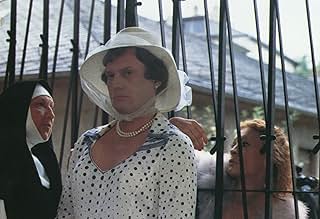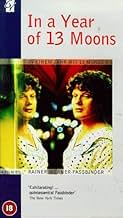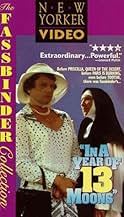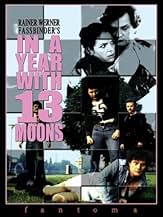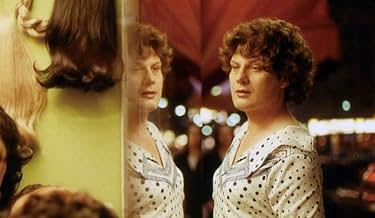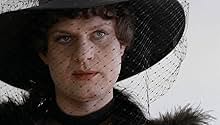PUNTUACIÓN EN IMDb
7,3/10
5 mil
TU PUNTUACIÓN
Añade un argumento en tu idiomaA transgender woman tries to salvage something from the wreckage love has made of her life by confronting her anguished past, hoping to find ultimate acceptance among former acquaintances an... Leer todoA transgender woman tries to salvage something from the wreckage love has made of her life by confronting her anguished past, hoping to find ultimate acceptance among former acquaintances and herself.A transgender woman tries to salvage something from the wreckage love has made of her life by confronting her anguished past, hoping to find ultimate acceptance among former acquaintances and herself.
- Dirección
- Guión
- Reparto principal
- Premios
- 1 premio en total
Lilo Pempeit
- Schwester Gudrun
- (as Lieselotte Pempeit)
Janez Bermez
- Oskar Pleitgen
- (sin acreditar)
Rainer Werner Fassbinder
- Self
- (metraje de archivo)
- (sin acreditar)
Günther Holzapfel
- Angestellter H. H. Brei
- (sin acreditar)
Ursula Lillig
- Putzfrau
- (sin acreditar)
Augusto Pinochet
- Self
- (metraje de archivo)
- (sin acreditar)
Reseñas destacadas
I have to save my comments for later...I began watching this film last night and, as disturbing as the slaughterhouse scene actually is, I was only able to make it halfway through. I will return. It amazes me when a film disturbs me so much that I cannot watch it in one sitting. I had similar reactions to both Pasolini's "Salo" and to Cronenberg's "Crash".
But I'm curious to learn from anyone who might have a clue why Nino Rota's theme music from "Amarcord" (original orchestration) was put in this movie's first half and yet isn't credited on IMDb's list of "combined details".
Anybody who might offer some insight on this omission....thanks for posting it here....
But I'm curious to learn from anyone who might have a clue why Nino Rota's theme music from "Amarcord" (original orchestration) was put in this movie's first half and yet isn't credited on IMDb's list of "combined details".
Anybody who might offer some insight on this omission....thanks for posting it here....
First of all, I would not call this a trans-or LGBT-themed film. Elvira, the main character, may have had trans surgery, but the plot makes it clear that they aren't a trans woman, that they made a mistake having the surgery. But it's also clear that the main character isn't a man, either-they are a person with a lack of identity. So it's a mistake to classify this one with the stories of trans men and women, it's about something very different.
Elvira's lack of identity surfaces in the fact that they can't remember their childhood at all, and when they search for details on it, the results are even more frustratingly ambiguous. They think that loving someone else gives them an identity, and it is this part of falling in love that they love the most-not so much being with another human being, but what it turns them into. That's why they undergo the surgery-because they think it will make them something when they are starting out as nothing. The surgery is just another turn of the screw for them-just another way of groping for an identity that isn't there. It's a much bleaker and more existential story than any trans-themed film I've ever seen.
The film leaves us with more questions than answers, which is how it should be. The characters speak in long monologues that raise lots of questions but no answers. They're more riddles than statements, and it's maddening. Maddening because the more Elvira searches for answers, the more they slip away from them. It's like a horrible taunt for Elvira, and we, in the audience, are not spared one moment of the terrible ambiguity of it all. Fassbinder's compositions add to the confusion, showing us a world that is as unclear to us as it is to Elvira.
For anyone going into this film looking for an LGBT story, you will be disappointed, as you will be if you like a story with a solid resolution. But for those who tolerate ambiguity and frustration-and, indeed, see how they can be virtues in art-you may well be dazzled and hypnotized.
Elvira's lack of identity surfaces in the fact that they can't remember their childhood at all, and when they search for details on it, the results are even more frustratingly ambiguous. They think that loving someone else gives them an identity, and it is this part of falling in love that they love the most-not so much being with another human being, but what it turns them into. That's why they undergo the surgery-because they think it will make them something when they are starting out as nothing. The surgery is just another turn of the screw for them-just another way of groping for an identity that isn't there. It's a much bleaker and more existential story than any trans-themed film I've ever seen.
The film leaves us with more questions than answers, which is how it should be. The characters speak in long monologues that raise lots of questions but no answers. They're more riddles than statements, and it's maddening. Maddening because the more Elvira searches for answers, the more they slip away from them. It's like a horrible taunt for Elvira, and we, in the audience, are not spared one moment of the terrible ambiguity of it all. Fassbinder's compositions add to the confusion, showing us a world that is as unclear to us as it is to Elvira.
For anyone going into this film looking for an LGBT story, you will be disappointed, as you will be if you like a story with a solid resolution. But for those who tolerate ambiguity and frustration-and, indeed, see how they can be virtues in art-you may well be dazzled and hypnotized.
Many, if not all of Fassbinder's films focus on weighty, emotional issues and characters plunged into personal despair, but none more so than the torturous and overpowering melodrama of In a Year of 13 Moons (1978). Here, Fassbinder created a film that is completely miserable in both tone and content from the first frame until the last; with the director taking the personal loss over the suicide of his lover Armin Meier and turning it into a suffocating chamber piece of pain and humiliation. Like his earlier masterpiece, Fox and his Friends (1975), the film focuses on the personal exploitation and persecution of a sensitive character at the hands of the people that he loves, as he finds himself cast against a cruel backdrop of the grimy and oppressive homosexual sub-culture of 1970's Frankfurt. However, unlike Fox and his Friends, the spirit of Meier's death and the guilt that we assume Fassbinder was suffering from at the time of the film's conception have here removed any prevailing notion of hope or the promise of escape that hung-over the character of Franz - the lottery winning carnival worker from the aforementioned "Fox", as he sought an end to his cruel suffering - and replaced it with a continually degrading emphasis on shame and deprivation.
Fassbinder establishes the pitiless tone of the film right from the start, with an opening vignette showing our central character, dowdy transsexual Elvira Weishaupt, dressed as a man and wandering through a park in the early hours of the morning looking for trade. After successfully managing to hook-up with a suitably butch male-prostitute, her secret is soon discovered and the 'john', alongside a couple of similarly macho friends, beat and mock Elvira, leaving her as a shivering, crying wreck, half-naked on an disused train-track. From here, Elvira limps home to her cramped apartment only to be plunged into a torturous, violent argument with her ex-boyfriend, which again, leaves her used and humiliated. The film continues in this episodic approach as we follow Elvira over the course of a few days and eventually find out more about her true character and personality and the events in her life that led to the eventual creation of the person that she is when we first discover her. These events are no less cruel and humiliating to the character of Elvira - who has clearly made a number of mistakes, either as a result of naiveté, arrogance or blind stupidity - as we discover the process that turned a handsome young man with a wife and infant daughter into an overweight, alcoholic wreck, abused and betrayed by the various men in her life, and the social pariahs that hang on the periphery.
As ever with Fassbinder, the presentation of the film underpins the feelings of the character and the world that she inhabits perfectly; with the cramped spaces of her apartment made even more prison-like and oppressive by the director's claustrophobic use of staging, design and composition. Fassbinder undertook the role of cinematographer himself here and shot the film on grainy 16mm, which again, adds to the stark and colourless feeling that the film conveys. The ugliness of the cinematography, with its dimly lit rooms, fragment composition and awkward camera movements could be seen as either amateurish on the part of the filmmaker, or as a deliberate attempt to distance the viewer from the characters and the emotional subtext in a manner that is reminiscent of Brecht; or, more appropriately, Godard's cinematic appropriation of Brecht and his theatre of alienation. As with the subsequent political satire, The Third Generation (1979) - once again, shot by Fassbinder himself - the unconventional approach to cinematography is combined with further elements that attempt to similarly disarm us and make the process of viewing the film as difficult as possible. The opening scene itself is emblematic of this approach, with Fassbinder obscuring the frame with large titles and an opening text that scrolls slowly over the entire frame before continuing with his use of obscured images and fragmented mise-en-scene.
Fassbinder also uses jarring cuts, with scenes seemingly beginning during the middle of a conversation or after the context of the scene has already been established, whilst sound and the disorientating way in which the director has characters talking over one another while music plays disconcertingly in the background all continue this idea of deconstruction and emotional distraction. The ugliness of the film fits perfectly with its tone; with the legendary scene in which Elvira and her friend wander ghost-like through an actual slaughterhouse, where cows are dispatched in graphic detail, whilst a monologue is recited to give us the entire back-story of this truly tragic figure. Whether or not Elvira is an extension of Fassbinder or the personification of Armin Meier is unknown, though there is certainly that element to the interpretation. I'd imagine that there is also some of the director in the portrayal of manipulative antagonist Anton Saitz, who recalls the depiction of Fassbinder in the director's own segment of Germany in Autumn (1978). Regardless, In a Year of 13 Moons is a fascinating if entirely difficult work from Fassbinder; one that brims with an uncomfortable feeling of personal confession and searing self examination that is grotesque, repellent and utterly draining, whilst also standing as a powerful and passionately realised piece of work that is both remarkable and affecting.
Fassbinder establishes the pitiless tone of the film right from the start, with an opening vignette showing our central character, dowdy transsexual Elvira Weishaupt, dressed as a man and wandering through a park in the early hours of the morning looking for trade. After successfully managing to hook-up with a suitably butch male-prostitute, her secret is soon discovered and the 'john', alongside a couple of similarly macho friends, beat and mock Elvira, leaving her as a shivering, crying wreck, half-naked on an disused train-track. From here, Elvira limps home to her cramped apartment only to be plunged into a torturous, violent argument with her ex-boyfriend, which again, leaves her used and humiliated. The film continues in this episodic approach as we follow Elvira over the course of a few days and eventually find out more about her true character and personality and the events in her life that led to the eventual creation of the person that she is when we first discover her. These events are no less cruel and humiliating to the character of Elvira - who has clearly made a number of mistakes, either as a result of naiveté, arrogance or blind stupidity - as we discover the process that turned a handsome young man with a wife and infant daughter into an overweight, alcoholic wreck, abused and betrayed by the various men in her life, and the social pariahs that hang on the periphery.
As ever with Fassbinder, the presentation of the film underpins the feelings of the character and the world that she inhabits perfectly; with the cramped spaces of her apartment made even more prison-like and oppressive by the director's claustrophobic use of staging, design and composition. Fassbinder undertook the role of cinematographer himself here and shot the film on grainy 16mm, which again, adds to the stark and colourless feeling that the film conveys. The ugliness of the cinematography, with its dimly lit rooms, fragment composition and awkward camera movements could be seen as either amateurish on the part of the filmmaker, or as a deliberate attempt to distance the viewer from the characters and the emotional subtext in a manner that is reminiscent of Brecht; or, more appropriately, Godard's cinematic appropriation of Brecht and his theatre of alienation. As with the subsequent political satire, The Third Generation (1979) - once again, shot by Fassbinder himself - the unconventional approach to cinematography is combined with further elements that attempt to similarly disarm us and make the process of viewing the film as difficult as possible. The opening scene itself is emblematic of this approach, with Fassbinder obscuring the frame with large titles and an opening text that scrolls slowly over the entire frame before continuing with his use of obscured images and fragmented mise-en-scene.
Fassbinder also uses jarring cuts, with scenes seemingly beginning during the middle of a conversation or after the context of the scene has already been established, whilst sound and the disorientating way in which the director has characters talking over one another while music plays disconcertingly in the background all continue this idea of deconstruction and emotional distraction. The ugliness of the film fits perfectly with its tone; with the legendary scene in which Elvira and her friend wander ghost-like through an actual slaughterhouse, where cows are dispatched in graphic detail, whilst a monologue is recited to give us the entire back-story of this truly tragic figure. Whether or not Elvira is an extension of Fassbinder or the personification of Armin Meier is unknown, though there is certainly that element to the interpretation. I'd imagine that there is also some of the director in the portrayal of manipulative antagonist Anton Saitz, who recalls the depiction of Fassbinder in the director's own segment of Germany in Autumn (1978). Regardless, In a Year of 13 Moons is a fascinating if entirely difficult work from Fassbinder; one that brims with an uncomfortable feeling of personal confession and searing self examination that is grotesque, repellent and utterly draining, whilst also standing as a powerful and passionately realised piece of work that is both remarkable and affecting.
Fassbinder's genius is making you feel as trapped and desperate as Elvira, you really feel empathy for the character. Only the visit with her family is there a brief respite from her pain. Kudos for Fassbinder for his good taste in using Suicide's "Frankie Teardrop" on the soundtrack--a song about a man who feels trapped, but directs his anger outward, rather than inward, like Elvira.
The story the idea of this movie, is amazing. It really does showcases how somebody that went through extreme child trauma being isolated, lonely, sad, wanted love from a male figure, and that was not possible from the one he-she wanted. It really is a fascinating story.
However, i have a huge problem with this movie and that's the pacing. I can assure you that 40 minutes or so could of been removed from this movie, and we'd have a better paced movie.
Minus the pacing, everything here works. The acting is alright, the camera work is okay, the story is alright. Everything here works. Minus the pacing.
The cow slaughtering scene was completely out of left field. Yes yes, our main character our star, worked as a butcher. But the problem with that is, this whole movie is a tragic, depressing drama. And out of no where, we just get cow murder exploitation? Why??? It really did not have to be in this movie at all! We had a tragic drama, and we added cow murder for no reason! It's so out of field, it pulls you out of the story completely, and it felt like i was watching FACES of DEATH again. Ludacris.
Another problem i got is, the suicide scene of that man. It has nothing to do with the story it's just added there so the movie gets longer and padded. This entire movie could of been better if stuff that have nothing to do with the movie aren't here. Also the prologned television scene, it took them ages for that to finish.
Ultimately yes i enjoyed this movie, but at the same time it is a chore to get through it really is. Also i think i have to rewatch this probably 2 - 3 time to actually get all the details. There's many details in this that are really hard to follow.
I mean if you are into drama misery films like JACOB's LADDER, you'll probably enjoy this.
However, i have a huge problem with this movie and that's the pacing. I can assure you that 40 minutes or so could of been removed from this movie, and we'd have a better paced movie.
Minus the pacing, everything here works. The acting is alright, the camera work is okay, the story is alright. Everything here works. Minus the pacing.
The cow slaughtering scene was completely out of left field. Yes yes, our main character our star, worked as a butcher. But the problem with that is, this whole movie is a tragic, depressing drama. And out of no where, we just get cow murder exploitation? Why??? It really did not have to be in this movie at all! We had a tragic drama, and we added cow murder for no reason! It's so out of field, it pulls you out of the story completely, and it felt like i was watching FACES of DEATH again. Ludacris.
Another problem i got is, the suicide scene of that man. It has nothing to do with the story it's just added there so the movie gets longer and padded. This entire movie could of been better if stuff that have nothing to do with the movie aren't here. Also the prologned television scene, it took them ages for that to finish.
Ultimately yes i enjoyed this movie, but at the same time it is a chore to get through it really is. Also i think i have to rewatch this probably 2 - 3 time to actually get all the details. There's many details in this that are really hard to follow.
I mean if you are into drama misery films like JACOB's LADDER, you'll probably enjoy this.
¿Sabías que...?
- CuriosidadesThe tape-recorded narration heard throughout the film (particularly during the final scene) was not scripted. Volker Spengler (playing Elvira Weishaupt) and Rainer Werner Fassbinder recorded the narration together, with Fassbinder asking questions and Spengler responding in character. In the final cut of the film, Fassbinder's voice is edited out.
- Banda sonoraSchöner fremder Mann
Music and Words by Athena Hosey and Hal Gordon and German lyrics by Camillo Felgen
Performed by Connie Francis
Selecciones populares
Inicia sesión para calificar y añadir a tu lista para recibir recomendaciones personalizadas
- How long is In a Year with 13 Moons?Con tecnología de Alexa
Detalles
- Fecha de lanzamiento
- País de origen
- Idioma
- Títulos en diferentes países
- In a Year with 13 Moons
- Localizaciones del rodaje
- Empresas productoras
- Ver más compañías en los créditos en IMDbPro
Taquilla
- Presupuesto
- 700.000 DEM (estimación)
- Duración2 horas 4 minutos
- Mezcla de sonido
- Relación de aspecto
- 1.66 : 1
Contribuir a esta página
Sugerir un cambio o añadir el contenido que falta

